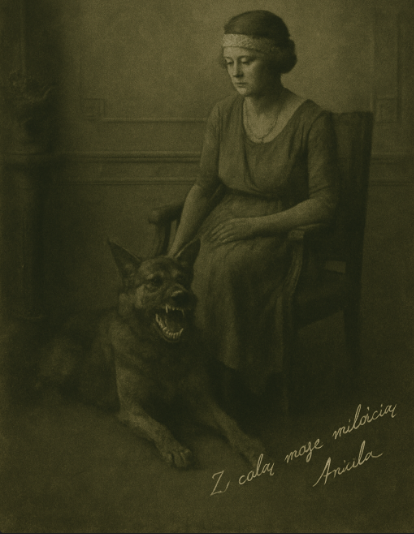Historia o psie nocy

She always came when the fog hung heavy over the fields — a fog so thick it seemed to swallow every sound, every light, every breath of warmth.
When shadows seemed to move on their own among the trees, and the moon no longer pierced the sky, smothered by a blanket of dark clouds.
No one ever spoke her name aloud — for those who did were said to die screaming in their dreams, their eyes wide open, frozen in terror no one could understand.
She was bent and gnarled like a withered root torn from cursed soil. Her hair, tangled and coarse, was gray as cold ash and hung low over her face like a mourning veil.
No one ever saw her eyes, for her gaze remained locked downward, as if she were in silent conversation with the bones of the dead that slumbered beneath the earth.
Birds — mostly crows or ravens — would gather in great flocks before her arrival. But they never cawed. They circled overhead in perfect silence, as if the very air refused to carry sound in her presence.
Some claimed a sudden, unnatural chill crept into the bones of those nearby — others spoke of a sour, rotting stench that clung to the mist as she passed. The smell of wet earth, decayed leaves, and something far fouler.
By her side walked a creature not of this world.
A black dog, far too large for any earthly breed — its massive shape moving like a shadow detached from the body of night itself. Its eyes glowed red, like smoldering coals buried deep in the firepit.
Though covered in fur black as the void, those who saw it under a moonless sky claimed they could glimpse bones through its smoke-like body — as if it were not flesh at all, but the ghost of a beast that should never have lived.
And it did not bark.
It screamed — a long, human-like wail, like a man being torn apart slowly in some forgotten place.
Those who heard that scream said they couldn’t sleep for nights — some never again — and a few who laid eyes upon the creature wandered off into the woods and were never the same. They stared too long into something no mind was meant to see.
The woman spoke, but in no language anyone knew.
Some believed it was Old Polish, long lost and twisted by centuries of silence. Others swore it was no human tongue at all — something older, something colder.
Those who claimed to have met her said their minds blurred afterward. Days passed in a haze, faces became unfamiliar, and even their own voices sounded distant. As if their memories were trying to protect them by forgetting.
Old farmers whispered in hushed voices that she was searching for her lost son — a child who vanished into the moor during the great flood of 1889. But others insisted she had never truly lived at all, that she was something summoned, or cursed, or born from the sorrow of the land itself.
No one ever found where she dwelled. No one saw her under daylight. She existed only in the fog, in the twilight between sleep and waking.
She walked the ancient, moss-covered paths that wound through the woods and between forgotten fields. Always when the fog rolled in.
Sometimes the sound of rusted chains dragging through wet leaves echoed faintly through the mist. Or the soft clink of metal — like iron bands brushed by unseen hands. But when searched for, there was nothing.
Some children, emboldened by stories or by foolish courage, once followed her.
Of those who returned, none ever spoke again. Their eyes remained fixed, unblinking, as if they still saw something no one else could. As if they were still walking with her — in their minds.
In 1911, a boy went missing not far from the moor. Searchers found only his jacket. It was torn, soaked in cold ash, and covered in thick, black dog hair that shimmered strangely in the light — as if it repelled it.
They say if you ever see her, your only hope is to keep walking.
You must not stop.
You must not speak.
You must never look back.
Because she does not see you.
Not yet.
„Przysięgam na własne życie: ona stała pośrodku pola. Żadnego światła, żadnego dźwięku – tylko ten pies… Na początku go nie było. Potem nagle: dwa świecące punkty. Uciekłem. Tak szybko jeszcze nigdy nie porzuciłem kosy.”
– Rolnik Jurek P., z dziennika z 1912 roku
„Nikt nie chce tego słyszeć, ale ją pobłogosławiłem. Nie drgnęła. Żadnej reakcji. Tylko pies warczał głęboko – a woda w kropielnicy zrobiła się czarna.”
– Notatka księdza Tadeusza L., 1947
„Mówią, że przychodzi tylko wtedy, gdy ją wołasz. To nieprawda. Przychodzi wtedy, gdy myślisz, że jesteś sam. Wtedy już tam jest.”
– Anonimowy pustelnik, odnaleziony w liście bez daty
↑ Back to Top
